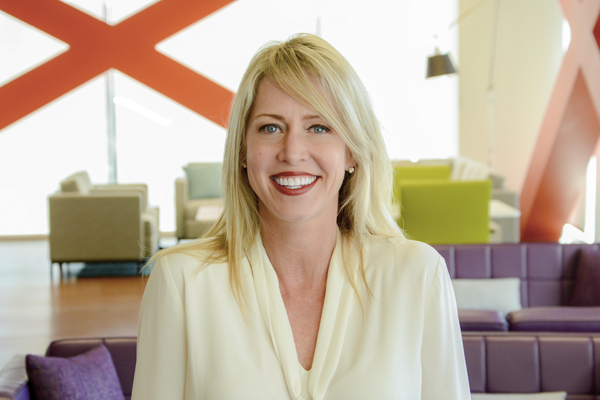Trust is key for a happy and engaged workforce because it has a direct impact on an employee’s sense of belonging at work, as well as productivity and mental health. Ultimate Kronos Group’s (UKG) Nicole Bello outlines the importance of ‘bi-directional’ trust among leaders and employees; and how to establish it in the workplace.
The power of trust in the workplace has been brought to the fore over the last year more than ever before, with it being esteemed to hold the key to unlocking a high-performing workplace culture. The impact of trust on an organisation’s overall employee engagement strategy is undeniable; and many organisations are coming to the realisation that great businesses are powered by great people.
We at UKG know the importance of trust and have certainly put it to the test this past year. On 20 February 2020, Kronos Incorporated Ultimate Software announced a definitive merger, forming one of the world’s largest cloud companies, bringing together two award-winning, people-focused cultures. While we soon realised that merging two global companies with thousands of employees globally, we knew that bi-directional trust and the strong relationships and culture would be imperative to success of this transition to UKG.
The importance of trust in the workplace was really brought to the fore by a recent global survey from The Workforce Institute at UKG which found that two thirds (67%) of UK employees and business leaders believe that trust should be earned; and only 57% feel that they are trusted to complete daily responsibilities. In addition, 60% of employees say trust has a direct impact on their sense of belonging at work. So, the question is, how can trust be established in the workplace and grow to be bi-directional among leaders and employees?
IMPACT ON PRODUCTIVITY
Why is trust in the workplace so critical in 2021? The previous stats highlight the impact trust has on the workforce and therefore the overall productivity of an organisation. When trust is lacking from workplace relationships – whether with coworkers, managers, or in the processes that define their day-to-day work – it can have a variety of negative outcomes.
As an example, employees who do not feel trusted are less productive; 61% say that the perception of low trust hurts their daily effort. This is a huge impact, and especially when the current economic outlook is taken into consideration. As many businesses look to rebuild in the wake of the pandemic, it becomes even more important that organisations instil trust. Put simply, it’s good business sense to put people first, focusing on their individual needs. By taking this approach a more harmonious workplace culture is created which positively impacts employees; and subsequently their output.

MENTAL HEALTH IMPACT
But productivity isn’t the only area in which trust impacts. Half of all employees surveyed (51%) feel a lack of trust impacts their mental health. We’ve sadly seen this exacerbated by the pandemic, with our research outlining that 57% think it is easier to trust colleagues in a physical workplace versus those working virtually.
Consequently, it’s crucial that leaders are intentional in their communication with employees – having a more personal touch in messages and show empathy during tough times; as well as discussing business issues and topics that provide better insight into the happenings at the organisation can demonstrate trust in employees to obtain this information.
A positive take away from the pandemic is that over half (59%) say the period has positively reshaped perceptions about flexible and remote work arrangements. As we begin to emerge from the pandemic, this sentiment should be taken into particular consideration by leaders if they are to maintain that trust with employees.
FUNDAMENTALS FOR ESTABLISHING TRUST
There is no one correct way of establishing trust in the workplace. Our research identified the key areas that should be addressed if a successful relationship is to be built between managers and employees. People managers state that employees can earn their trust through producing quality work (46%), being dependable (39%), and by being good listeners (34%). On the flip side, employees state that their managers can earn their trust through being good listeners (57%), being dependable (46%), and being honest about projects or situations (36%).

It goes without saying there are clear alignments here in what both managers and employees need from one another; but it’s interesting to see that essentially managers trust employees based on the quality of their work first and foremost, and employees trust managers based on the softer skills. Knowing this, I believe that leaders must take the time to connect with employees on both a professional and personal level. Forming an allyship between manager and employee can be extremely powering when it comes to trust in the workplace. This can be done by conducting one-on-one meetings with the aim of listening to an employee about their projects, what they feel they are doing and the areas they feel could use help or coaching to improve going forward.
TRUST IN A POST-PANDEMIC WORKPLACE
It’s clear that trust is a foundational imperative in the employee engagement strategy, and it goes without saying that this will be brought to the fore more than ever before in a post-pandemic workplace. Embarking on this journey of earning and building trust can seem daunting – particularly with the uncertainty and hurdles posed by the pandemic. However establishing trust at this time more than ever before will help to mitigate the challenges faced by every employee. It is really crucial that managers don’t want until their teams are back in the office to begin this initiative.
Remote working is set to become the norm; albeit not 100% of the time for many white-collar employees. But it is important that managers look to build the foundations of trust now and not wait for what may feel like a better time. The principles that employees believe to be most important in ensuring they trust their managers can still be established in virtual environments. The time and effort must be made now.
Leaders that long to create a happy, healthy and engaged workforce and leaders must be proactive in establishing trust within their organisations. Those that recognise the need for trust to be a foundational imperative will have a more engaged workforce as a result, and ultimately a more successful business.

AUTHOR BIOGRAPHY
Nicole Bello is Group Vice President of small and midsize business and channel sales in Europe, the Middle East, and Africa (EMEA) at UKG. Bello leads regional teams with the philosophy that people are an organisation’s greatest differentiator and relays the value of the employee experience in fostering growth to prospects, customers and partners, in both established and emerging markets. She spends the majority of her time supporting business leaders in their organisations’ workforce management evolution and guiding them into the future of work. As a woman in leadership, Bello is passionate about talent development, within her own team as well as current and prospective customers she works with.








































